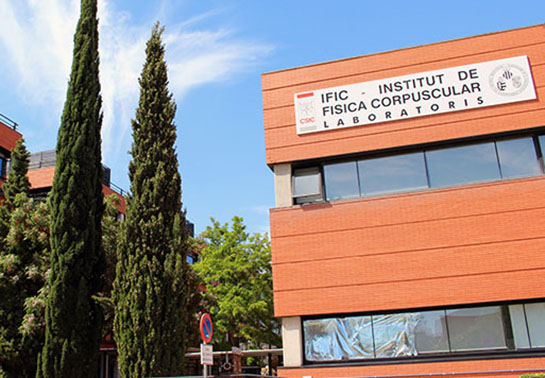IFIC, first Spanish centre for scientific impact in fundamental physics
- Fundació Parc Científic
- May 17th, 2018

Institute of Corpuscular Physics (IFIC, Centre of Excellence Severo Ochoa of the CSIC and the Universitat de València) is the first centre of Spanish research for its recent contribution to the fundamental physics, according to Bliblioranking fundamental physics. IFIC ranks 15th out of a list of 80 research centres and universities of the whole world according to the quality and impact of the scientific publications of researchers. On the top of the list if the CERN, European laboratory of particle physics with headquarters in Geneva (Switzerland), followed by Fermilab and Brookhaven, both in United States. The IFIC is ahead of institutions as Caltech, the MIT or universities of Oxford and Stanford.
The study analyses publications in “fundamental physics” listed in the system of information INSPIRE, that contains a million of articles published in 4.000 journals by 100.000 authors of 10.000 institutions. This database is a reference in particle physics, nuclear physics, astroparticle physics and general relativity and cosmology, scientific disciplines that study the components of the matter and the forces that rule them.
The authors, Alessandro Strumia (CERN) and Riccardo Torre (INFN), propose new methods to evaluate excellence of an author or article using more factors than those used traditionally, as total number of quotes or the named “h-index”. The aim is to avoid the known Goodhart's Law, that summarises: “when a indicator becomes a target, loses its information content”. Methods are based on algorithms as the PageRank of Google to avoid bias as the auto-quotes, or that an article accumulates a lots of quotes only in a scientific community or in small circle.
Authors and articles more recent are differentiated in the study, and factors are introduced to correct the co-authorship in articles and number of publications in higher-productivity areas. Following that method, authors joined the total number of individual quotes obtained by articles according to the filiation of their authors. That is, the research centre where they work, to establish a list of 80 laboratories and universities according their contribution to the fundamental physics.
Based on this classification, the CERN heads the list of publications, from the historical point of view as much as currently. Regarding recent contributions, published articles from 2010, the IFIC ranks 15th of the list with the National Laboratory Lawrence of Berkeley (USA), and ahead of known institutions as Caltech (17th), the MIT (19th), University of Stanford (20th), Princeton (23th), Harvard (31th), Oxford (33th) or Zurich (42th). There is another research Spanish centre, the Institute of Theoretical Physics (IFT, UAM/CSIC) in the 54th position.
IFIC, third of the world in phenomenology
Ranking also provides scores for each area. IFIC is the third centre of the world for his contribution to the called “phenomenology of high energy physics”, that consists on the application of theories and calculations to experiments. Only two laboratories that have dominated particle physics in the lasts decades, CERN and Fermilab, are ahead of the IFIC in this area. Other areas, where the Valencian centre stands out, are the experimental particle physics, astroparticle physics and theoretical nuclear physics.
The Institute of Corpuscular Physics (IFIC) is a mixed centre of the Spanish National Research Council and the Universitat de València dedicated to research in Nuclear Physics, of Particle and of Astroparticle and its applications, in Medical Physics as well as in other fields of the Science and Technology. With a career which dates back to the 1950’s, IFIC is pioneer in Spain in Research in Constituents of Matter to Physics. It participates in international experiment as those that are taking place at the Large Hadron Collider (LHC) of CERN, KM3NeT or FAIR, both considered scientific infrastructures priority for Europe. In 2015 was accredited as Centre of Excellence Severo Ochoa for the reputation of its scientific contribution in national level as well as international, its impact in the society and industry and its capacity to attract talent.
More information:
File in: Ciencias de la Vida , Física
















